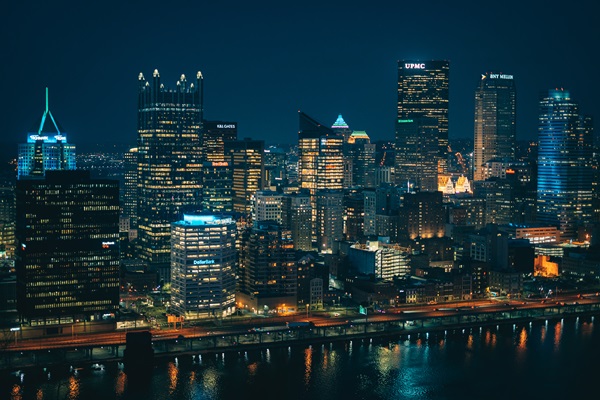Pittsburgh Ranks 15th in U.S. for Worst Traffic Congestion

If you've noticed worsening traffic congestion in and around Pittsburgh, you're not alone. A recent international study of vehicle travel patterns confirms the growing frustration for local commuters.
According to the latest report from Inrix, a global analytics firm, Pittsburgh ranked as the 15th most congested city in the United States in 2023. Drivers in the city spent an average of 43 hours stuck in traffic last year, a five-hour increase from 2022.
The study also highlighted the financial impact of these delays. The average Pittsburgh driver lost an estimated $749 in extra fuel costs, while the region as a whole suffered a productivity loss valued at $724 million.
While traffic delays have decreased by 14% since pre-COVID levels, Pittsburgh's ranking dropped from 14th place in 2022 to 15th in 2023.
What causes so much traffic congestion in Pittsburgh?
Pittsburgh has a relatively high population density, particularly in and around the downtown area. The city's roads include many narrow streets and sharp turns that become bottlenecked.
Plus, many of Pittsburgh's roads and bridges were built decades ago and are not equipped to handle the current volume of traffic.
How does traffic congestion contribute to car accidents?
Traffic congestion contributes to car accidents in the following ways:
- Increased stop-and-go driving: This can increase the likelihood of rear-end collisions, as drivers may not anticipate sudden stops by vehicles in front of them.
- Reduced reaction time: In heavy traffic, drivers must often adjust their speed and position quickly. This can result in missed signals or delayed responses to sudden changes in traffic conditions.
- Driver frustration and aggression: Prolonged traffic delays can lead to driver frustration and aggressive behavior, such as tailgating or risky maneuvers to bypass slower-moving vehicles.
- Lane Changes and merging issues: Congested roads often require drivers to change lanes or merge into other lanes frequently. This can lead to side-impact collisions, particularly if drivers misjudge the speed and distance of other vehicles.
- Distracted driving: In heavy traffic, drivers may become more prone to distractions, such as using mobile devices or engaging in other non-driving activities.
What types of car accidents typically occur in traffic congestion?
In traffic congestion, several types of car accidents are more common. While they tend to happen at lower speeds, they can still result in serious damage and injuries. These typically include:
- Rear-end collisions
- Side-impact collisions
- Fender benders
- Lane change and merging accidents
- Parking lot accidents
- Collisions with pedestrians and bicyclists
While these accidents might happen at relatively low speeds, they can still result in whiplash, soft tissue injuries, and even concussions. In some cases, broken bones, spinal injuries, and internal damage can occur. Bicyclists and pedestrians are particularly at risk of sustaining serious injuries.
Injured in a Pittsburgh crash? Our attorneys can help
Traffic congestion isn't a cause of car accidents in Pittsburgh. It's only a contributing factor. Car accidents result from human error, such as driving distracted, impaired, drowsy, or aggressively.
If you were injured in a car accident that wasn't your fault, you have the right to seek damages from the at-fault driver's insurance company. But doing so isn't that easy. Insurance companies will go to great lengths to keep their costs down, even if it's clear that the other driver was to blame.
That's why the Pittsburgh car accident attorneys at Romanow Law Group are dedicated to fighting for the rights of injured motorists and holding those responsible accountable. Our track record of handling car accident claims allows us to protect your rights and aggressively advocate for your best interests.
For instance, in one car accident case, we recovered $1,099,500 for our client. To find out how we can help with your potential legal case, contact us today for a free and confidential consultation.
